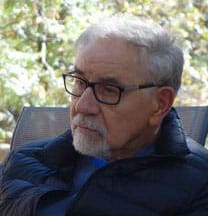Rabbi Charles Simon, a recent visiting lecturer at American Jewish University (AJU), asked rabbinical students how they would deal with a future intermarriage. One young rabbi-to-be said he’d welcome the couple … then tell them that, unfortunately, he couldn’t marry them. Simon, clearly taken aback, answered quickly: “No, don’t tell them that. Don’t ever approach things from a negative point of view, especially with a couple who want to be part of your synagogue. … We shouldn’t lose sight of the fact that we’re a diverse community united in a common goal — to find meaning in Jewish life.”
Simon is executive director of the Federation of Jewish Men’s Clubs (FJMC), an auxiliary arm of the Conservative movement, and he talked about intermarriage because it’s a key element of his overriding concern: how to increase men’s involvement in synagogue life, including men who are intermarried. Simon, who’s 62 and lives in Manhattan, became head of FJMC more than 30 years ago, after receiving his rabbinic ordination from New York’s Jewish Theological Seminary.
During his recent swing through Southern California, in addition to talking with AJU students, Simon also met with several rabbis and their staffs, discussing the changing nature of men’s place in society, the effects of that change on Jewish institutions, and offering his suggestions about how to try to reverse what to him is a worrisome trend. In a monograph called “The Diminishing Role of Jewish Men in Jewish Life: Addressing the Challenge,” Simon’s conclusion, based on studies as well as anecdotal evidence, is that “Jewish boys and Jewish men are drifting to the fringes of the organized Jewish community and are beginning to disappear on its borders.”
Simon points out that the decreasing role of men in Jewish life parallels what’s happening in American secular life, and it’s “not an encouraging picture.” Women are more engaged in academia than their male counterparts. They “study longer and harder [than men] and … are becoming more successful in the workplace. Women study [while] men play video games. Men are rapidly becoming the second gender.”
Synagogues are experiencing a parallel phenomenon: a growing gender imbalance, as evidenced by the declining rate of male volunteerism in synagogue institutions. He urges synagogue leaders to take steps to try to correct that situation, such as by getting men to join a synagogue-affiliated men’s club in order to “engage men more actively in Jewish life.”
“We’ve intensified our reach-out to our clubs and encourage the men’s clubs to hold what we call ‘Hearing Men’s Voices’ sessions,” Simon said in an interview. In these events, topics have included men’s spiritual lives, their health issues, men’s role in the Jewish family, and the place of work in men’s lives.
“While one of our primary goals is to service and build men’s clubs in Conservative synagogues,” Simon said, “we’re beginning to serve as the voice of Jewish men.” Simon added that FJMC now has 350 men’s clubs, with some 30,000 men participating.
Simon believes synagogue leaders need to “engage men at any age, whether married and with infants, or whether they have adult children who are no longer living at home.”
He listed some ways to reach out to men at these different stages. The father of a young toddler often feels the urge to put the child over his head and throw him or her around. “The mother’s instinct,” Simon said, “is to say, ‘Don’t do that, you’re going to drop them.’ ” But, Simon said, the father’s behavior is not only wired into men’s DNA, it’s also useful. “When a toddler is picked up, what the father is teaching the child is how to become comfortable with their bodies and how to take risks.”
Simon’s point is that when a wife warns her husband about holding a child aloft, this shouldn’t necessarily be the cue for him to stop the activity, but rather an opening to engage his wife in a discussion. “The husband can say, ‘Don’t worry, I’m not going to drop her.’ ”
This kind of advice is normal in any men’s group — Jewish or not — where men assure one another that their male instincts, in spite of what women may say, are natural and healthy. Whether this strategy draws men into synagogue life remains to be seen.
Another example has to do with men who have adult children. “I have a bunch of 50-, 60-year-old men right now, who six months ago started texting their adult sons and daughters, adult children living all over the place, ‘Shabbat shalom’ on a regular basis. Never did this in their entire life, and all of a sudden, they’re getting responses. And when the kids say, ‘Why are you doing this, Dad?’ And they say, ‘Because this is important for me,’ at that point the fathers realize that they still have influence in the Jewish decisions that their children will make.
“The connection of Jewish men to Jewish life is loosening,” Simon said. In the future, “There is an increasing risk of fewer men identifying Jewishly.” By using the men’s clubs to provide men with helpful strategies, with welcome information about important issues like intermarriage, with a forum where their voices can be heard at every stage of their lives, Simon hopes to “alter the current trend of diminishing male involvement.”
FJMC’s current outreach initiative, Simon said, “is really in the start-up stage. For years, people have been saying, ‘Where are the men? What’s going on with the men?’ But no one’s come up with a constructive way to understand what’s going on with the men, generally, and how to motivate and attract and engage men so that they can make more conscious decisions in a Jewish way at any stage in their lives.”























 More news and opinions than at a Shabbat dinner, right in your inbox.
More news and opinions than at a Shabbat dinner, right in your inbox.